#played the four characters in
Explore tagged Tumblr posts
Text
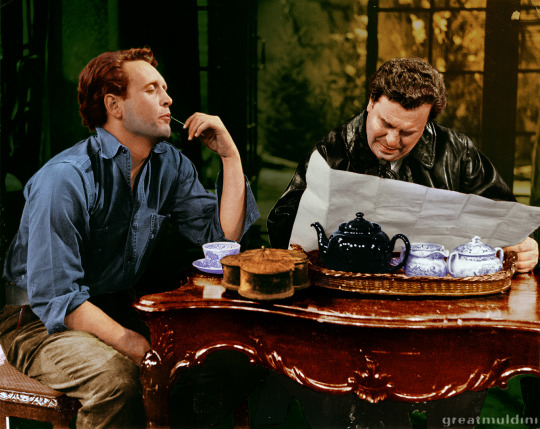
The Iron Harp
We’re all in prison together, Johnny, one way or the other.
Act 1
Outwardly, Joseph O'Conor's play is a simple tale of love and loss in times of war: set in rural Ireland in early April of 1920, the action takes place on the property of an English industrialist whose mansion has been taken over by a contingent of IRA volunteers. Their leader is Michael O'Riordan, a gifted poet-musician in civilian life and conveniently the peace-time manager of the Englishman's estate. Michael has recently been wounded in action; now blind as a result he is no longer on active duty but still responsible for an English prisoner of war. Being a man of his word, Captain John Tregarthen has made no attempt to escape, earning Michael's trust and eventually his friendship. He also earns the friendship and love of Michael’s cousin Molly Kinsella, with whom he spends long days roaming the extensive grounds of his idyllic prison. Dreaming of a future life together, the lovers are oblivious to the feelings of their “best friend” – who ends up sacrificing his love for Molly in what he hopes will be a lasting gesture of selflessness only to find that Fate intervenes, with devastating consequences for them all.
Completing the quartet of characters is the dark and “indistinct” figure of IRA commander Sean Kelly, a dark and "indistinct" figure who emerges from the shadows to immediately assert his authority not only in military matters but - crucially, and disturbingly - in those of the heart as well. Specifically, it is the heart of Michael O’Riordan that Kelly claims to know better than O’Riordan himself. As a flesh-and-blood character Kelly is difficult to pin down: cold and calculating by his own admission, he expresses admiration for Michael's hot-blooded fighting spirit. Michael's own startled response to Kelly entering "like Nemesis himself" is ambiguous at best, and even his description of Kelly as a “good friend” comes on the back of a warning to Johnny that "he won't like you."
When Kelly tells Michael that he has never been wrong and does not know what it means to feel regret, the sense of foreboding is inescapable, yet Michael never seems to give in to the negativity emanating from his old wartime comrade who admonishes him to see his friends “as they really are” and not as “you want to see them.” Ironically, Michael refuses to see an enemy in John Tregarthen, but he is equally stubborn in applying the same criteria of honour, loyalty, and friendship to Sean Kelly, who seems troubled by this flaw in Michael’s character: "you love people too much."
Michael's emotional warmth stands in stark contrast to Kelly's impersonation of infallibility - which Michael seems to accept as a token of his friend's unassailable integrity. He continues to defer to Kelly's judgment when a messenger arrives with bad news from the front: three IRA fighters have been killed in skirmishes with British forces, and reprisals must be carried out. Twisting the metaphorical knife in the very real emotional wound, Kelly as the commanding officer nominates blind Michael to be the impartial instrument of God's justice. Forced to select three victims for execution, Michael all but collapses when one of the chosen names is that of Captain John Tregarthen.
Act 2
After he has persuaded Johnny to flee the country and reunite with Molly back in England, Michael is left alone to guard the now empty house. Blind and unable to defend himself, Michael is powerless against two marauding Black & Tans who break into the property and proceed to taunt and abuse the solitary occupant. It does not take them long to realize their victim is an IRA member rather than a civilian enjoying certain protections. Further violence is prevented only by the surprise return of Captain Tregarthen, armed and in uniform, who holds the attacker at gunpoint until Kelly and his entourage arrive to take the men away. Where any other human being would have expressed relief or gratitude at the discovery that the life of his friend has been saved, Kelly’s reaction is characteristically impassive, betraying, if anything, a degree of irritation at the unforeseen complication that has shown the condemned prisoner – the enemy – to be capable of compassion and self-sacrifice in saving the life of his friend. Human qualities that Kelly explicitly claims not to possess. As if to prove the point, he responds with the formal announcement of Tregarthen’s impending execution.
The order is to be carried out within three days, enough time for Kelly to travel to headquarters - and return with a firing squad. But first he must interrogate the captured Tans. While Kelly is thus occupied, Molly manages to convince the love of her life to take her with him. Johnny only agrees to the plan on the promise that Michael will convince Kelly to rescind the execution. If Johnny and Molly can make their way to Belfast on the early morning goods train, and from there to England, all will be well. Michael knows how to distract the guards, and Molly can bribe the train driver to let Johnny jump aboard. Three loud whistles will give the all-clear. With hopes of future happiness rekindled, Molly and Johnny each rush off to their respective tasks, and Michael is left alone with three empty glasses that he cannot see – a detail that does not escape Kelly’s notice as he re-joins Michael to formally accept his plea for clemency. Which he says he will duly submit to "the general," but in his estimation the chances of success are slim. "For God's sake, don't build up hope," he tells Michael before agonizing – to himself – over how to soften the blow for Michael: by bringing the execution forward and keeping it secret, he is certain he can spare Michael the pain and the guilt of having to witness the event.
Act 3
In the pre-dawn hours of the following day, Michael and Johnny are wide awake and waiting for the sentries to change and the train to whistle. Thinking the house empty and their enemies far away, they pass the time in a dreamlike state of high anxiety, reciting heroic poems and melancholy songs in whispering voices, so as not to miss the stroke of six to mark the end of their nightmare and the beginning of a new life – only to see Kelly standing in the door, with orders for Johnny to be executed at dawn, 24 hours earlier than they were told originally. Michael's world is falling apart, he pleads with Kelly, he begs him to show mercy, but an almost equally distressed Kelly reminds him that "I have never promised you hope." Johnny declines the comfort of a priest or minister and is led away to meet his fate offstage while, also offstage, Molly will be waiting in vain for the love of her life to board a train that will never arrive.
Left on stage for their final confrontation are Michael and his Nemesis, both knowing full well that nothing they can do or say will change what Kelly might term the preordained outcome of their efforts. To Michael's accusation of "trickery" (by which he means Kelly's surprise return before the agreed time), Kelly offers no subterfuge, no defence, and no evasion. Instead, he says, Michael’s agony is self-inflicted: it was, in fact, his own stubborn insistence on hoping against hope that has now led to anguish and pain. The only way for Michael to end all suffering, Kelly explains, is to give up hope. Unless he manages to see past the private pain of the moment and becomes a distant observer, Michael will forever be "tortured by hope."
Here Kelly is borrowing from the Conte Cruel tradition made famous by Edgar Allan Poe but named after a collection of short stories by the French symbolist writer Auguste Villiers de l'Isle-Adam. A useful definition of the genre is that it concerns "any story whose conclusion exploits the cruel aspects of the irony of fate." Not only does Kelly borrow the concept, and the title from Villiers' tale, The Torture of Hope, he even recounts the plot to underline his point:a hapless victim of the Inquisition escapes his prison cell only to stumble into the arms of the Chief Inquisitor. The lesson for Michael is that, like the victim, he keeps on hoping for release only to suffer defeat over and over again. There are no similarities, however, between himself and the sadistic Inquisitor, Kelly says: his mission is to ease Michael'ssuffering, not to prolong it.
We are given no reason to doubt Kelly’s sincerity, but neither can we reconcile the apparent contradiction between his declared intention and putting Michael’s best friend before a firing squad. If Kelly wants to end all suffering, as he says, surely, a good start would be to save Captain Tregarthen’s life? It is the argument that Michael himself is trying to make, by reminding Kelly of his god-like powers. Michael’s understanding of those powers differs fundamentally from Kelly’s own. Michael’s life-affirming principle of hope and Kelly’s seductive all-consuming fatalism are the two opposing philosophies that take centre stage in the final scene – while John Tregarthen dies a largely symbolic death offstage.
Johnny’s death is symbolic in that it is not the tragedy at the heart of the play. Michael O’Riordon is the conventional male protagonist whose existential crisis we are witnessing; Michael is unable to prevent the execution of his best friend; and to make that very point, his best friend must die. Michael’s blindness contributes to this failure in the course of the play but read as a metaphor it turns Michael into “one of us.” His blindness leaves him vulnerable to attack and it echoes our own sense of powerlessness in the face of an overwhelmingly hostile universe. The reverse, however, is also true: being blind, and being a poet, puts Michael in the illustrious company of the Blind Bard, an archetype of Western literature since at least the (mythical) time of Homer: the blind singer/seer whose “inner vision” surpasses that of sighted humanity. His Irish equivalent – and explicit model for Michael - is the (dwarf) Harper of Finn, whose iron-stringed instrument has the power to move its audience to tears. Michael O’Riordon is both vulnerable and endowed with the superpower of emotional insight – fundamentally human qualities that Kelly admires in Michael, and which he admits he does not possess.
Kelly is an abstract concept in human form; even while he is evidently the cause of human suffering, in his denial he appears to be channelling the sadistic Inquisitor. The apparent contradiction is of our own making, though: Kelly is Cruel Fate personified. He represents that which we like to imagine as the source of all our woes - the betrayals, the injustices, the disappointments which inevitably end in what we define as tragedy and what to the rest of the universe, that hostile universe, is of no consequence whatsoever. If we substitute “hostile” with “indifferent,” then Kelly becomes the antithesis to Michael’s humanity – his indifference is as inhuman as the infinite, indifferent universe. Conversely, Michael is not concerned with an infinite universe; his frame of reference is on a human scale, and very finite. When Kelly challenges Michael to take his place and adopt his abstract, God-like perspective on life, death, and the universe, Michael does reject the responsibility – but also the indifference required for the position. If the promise of a pain-free existence did not convince Michael to abandon hope, Kelly's failure to shame him into admitting defeat is a testament, at the very least, to human perseverance: we will forever be prolonging the agony to delay the inevitable. (1/4)
#Patrick McGoohan#Patrick Macnee#Katharine Blake#Douglas Campbell#played the four characters in#The Iron Harp#on Canadian TV in 1959#the plan was to explain EVERYTHING in one brilliant post#well the good news is there will be four posts now wahoo#but I'm already posting out of order because I can't decide on the illustration to go with the historical background#as for the play itself#if you have made it this far and you still care#whether the characters are consistent with the general message the author is trying to convey#your powers of perseverance are truly heroic#the problem I think is that the story does not always align with the metaphor#which I still maintain is the human condition#we cannot ever beat death but we carry on regardless#is it just me or does that cryptic cry from#Free for All#obey me and be free#sound like something the evil Inquisitor or Sean Kelly would say#For Fleetstreetpauline#miss you always
15 notes
·
View notes
Text
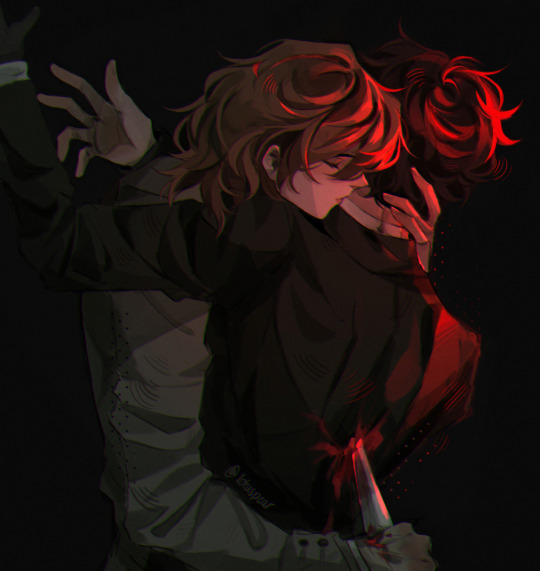
11/20
#big day for doomed yaoi enjoyers#(me)#i’m never ever doing this again i was screaming every minute coloring this i literally cannot do hard light#biggest case of “trust the process” i’ve ever experienced in my life#also i was gonna originally do a gun instead of knife to keep it canon but i quickly learned i can’t in fact draw guns#a knife is more symbolic anyway. stabbed in the back. yk#(trying to comfort myself that i can’t draw firearms even after eight years of art)#i remember playing this scene for the first time and actually breaking down at 2am bc that betrayal STUNG#i actually had no remorse for akechi after that 😭😭 i actually felt like a sadist for enjoying beating his ass in shidos palace#akechi as a character was specifically designed to make me go through all five stages of grief within a matter of minutes#absolute rollercoaster of emotions#ANYWAY IM FINALLY FREE TIME TO NOT DO ART FOR THE NEXT FOUR MONTHS 🙏🏼🙏🏼🙏🏼🙏🏼🙏🏼🙏🏼#persona 5 royal#persona 5#p5#p5r#ren amamiya#akira kurusu#goro akechi#akechi goro#shuake#akeshu#lotus draws
5K notes
·
View notes
Text

Happy Birthday to Fallen London; My favourite British people beefing it with bats simulator.
#fallen london#ambition: nemesis#mr.cups#Happy belated birthday to me: I finished my Nemesis ambition. I get to make a fun comic about it. THAT WAS THE DEAL!!!#...Is what I would have said had I not spent *four* days trying to draw a cool dramatic comic. This is all I have to show for it.#I also missed posting this on the Flondon anniversary so I'm double Smad and frustippointed at myself.#This is niche content but I know there are flondoners following me who will understand.#I had to make a second account because all my friends who I played with *also* picked Nemesis and dropped the game at various gates.#I failed every possible check at Knifegate. I was on the verge of madness. And yet I still love this game.#Little known secret about me: over 70% of the blogs I follow on tumblr are flondon rp blogs.#The cool art and character lore brings me a lot of joy!#With that said; what the hell is the coincidence that right as I finish Nemesis -#The flondon community starts a Nemesis Race.#Guys. it’s not worth it. It is a revenge quest about losing everything you have to see your task through.#All to culminate in the discovering that you are beefing it with a fanfiction writing bat.#That said; I do feel like this story was very satisfying for my melancholic doctor.#I knew I would get the choice between sparing or killing my nemesis (the bat) and I had a long time to think it through.#Someone who wants to save lives and (does as much as possible to do make things better for others) choosing against mercy?#Someone who never permitted themselves to let the city truly become a home because they were not a person - they were a tool for grief.#Alright..Yeah the ending was really good.#I will be back with a part two. Clearly I'm tenacious enough to commit to what I started.#If I am not excommunicated on sight by the flondon community I will be back with comics for the other ambitions.
515 notes
·
View notes
Text
The Chains Ages in Linked Universe.
I saw people talking about the Chains age in Linked Universe, and I have my thoughts on them.
I've done a LOT of research on the Links and how old they were, I even tried to figure out how long Legend was in Koholint for. (We go with old Canon because new Canon doesn't make since,(Footnote 1) but basically that's the last time we see Legend in normal Zelda Canon)
Anyways-

This is from Jojo's QnA doc on the Linked Universe Discord- ^^^
And this is my thoughts on their ages. Side note, I'm not going off of looking up their ages through google, I'm going off info you can find in game and cross referencing it with other games and the Hyrule Historia and Encyclopedia. Time was 9 in his game and that's about 20 years later so he would be 29. (Unless if we counting Majora's Mask, then he could be 30-32)
Twilight was a "Late Teen" (Also it does state hold old he is) so 17 making him 21 to 22.
Warriors is also "Late Teen" (He was a trainee at the beginning of the war) making him 22 to 26
Sky is also stated to be around 17 making him 18 to 19
Wild is 117 and this would make him either almost 118 or just turned 118.
Legend just became "Of age" in ALBW and that's 16 in his era making 17.
Hyrule we know is 16 making him 18.
Four is 15 or 16 in Four Sword, but he isn't "Of age" so probably 15. making him 17.
And we know Wind is 13 almost 14. (He said it himself)
I just find it very funny the Toons are the youngests. Age explanation and footnotes below cut.
Time - He is 9 at the beginning of his game and becomes an "Adult" 7 years later at 16. This is one of the times it proves that 16 is "Of age" in the Zelda series. We aren't sure how much time has passed between Oot and MM, so we can guess he's 29 to 32 (Making Link in MM 10 to 12 as a good guess.)
Twilight - It's stated in a guide that he is 17. His game also was originally supposed to be a continuation of Oot and MM in the Wind Waker style, with Time all grown up and living on his own. But they changed it to what it is now. So it's just 17+4 or 5 making him 21 to 22.
Warriors - There is no official age and you do NOT need to be 17 to wield the master sword. All we know is that he's "Late Teens" making him between 16 to 19. Making his age in LU between 22 to 26.
Sky - He is stated to be around 17. Making him 18 or 19 (Even if we say he's 16, then he would be 17 to 19.)
Wild - he is 117 years old. We know this. it's been "Less than a year" so he could be almost 118 or already be 118, he probably doesn't remember his Birthday, so there is no saying exactly. (His Zelda should know though. Maybe.)
Legend - SO. I feel like people are gonna fight me on this, but I got the math and hours of research to back it. At the beginning of ALTTP, some guards say that Link shouldn't be out here or that he's too young to wield a sword (Or even start learning to) In BOTW Wild got the Master Sword at 12-13. And people said he was still very young and a prodigy, which means he was already learning the sword by that time. and we also know that in BOTW they think of "Of Age" as 17 instead of 16, meaning they probably make them learn stuff when they are a little older. There's also the connection to Oot, In Wind Waker its stated that Wind is the same age as Time when he Defeated Ganon (Making Wind Canonically 16) And Twilight is the age of what Time should have been when he decided to settle down, making him 17, which leaves us with Legend's age. Most likely taking Times age from the beginning of his game. LONG STORY SHORT- In ALTTP Link is between 9 to 10. NOW. The Oracle games, Link is still a CHILD, so before "Of Age" (Aka less than 16) A LOT of people call him a CHILD and wonder why he has a sword! making him most likely around 11 or 12. Same things with Link's Awakening. (FOOTNOTE 1). Then we have ALBW. Link has a job now and is learning to become a smith. so most likely after his return home, as well as he needs to learn this stuff before becoming a full adult, but then again he lives alone, so we could accurately say 15 to 16. SO LONGER STORY SHORT. We can say 16 and be GENEROUS. Making Legend 17 in LU (but probably closer to 16).
Hyrule - It's literally a plot in his game he is 16, making him 18 in LU.
Four - He is a Child in Minish Cap (So less than 16) and same with Four Swords. He has to be older than 12 because he was given a sword willingly. So between 13 to 15, but we can be nice and say 15 in Four Swords, making him 17 in LU.
Wind -

I do want to say, it's literally stated in his game he is the same age as Time when he KILLED Ganon as an ADULT. It's just the art style of the game.... He JUST turned 16, so people are still calling him a child. (Like how people call 18 year olds children in rl) But also he does look 12 in game... ART STYLE WHYYYYYY (also thats what Twi was supposed to look like lmaoooo)
---
FOOTNOTE 1 - The Encylapedia has wrong information that's easy to disprove and I want to throw it out a window. It also switched the order of the Oracle games and Link's Awakening, even though Oracle of Ages LITERALLY ENDS With Link taking the boat out to sea to head home, and LITERALLY Transitions to Link's Awakenings Opening. ITS THE SAME BOAT. I'm Gonna Cry- NINTENDO WHYYYYY.
#legend of zelda#zelda#linked universe#lu#link#character analysis#character ages#linked universe chain ages#I was left alone for 5 minutes#I have streams where I'm just reading the books and crying about the info in them#lu sky#lu four#lu time#lu legend#lu hyrule#lu twilight#lu wind#lu warriors#lu wild#Theres more games that state that 16 is “Of Age” but It's midnight and I'm gonna go play games with friends.#Yes I did the LU Character analysis' on Youtube#I went and researched for a year and a half all these boys and their games#giving each their own time to shine#This wasn't a quick google search this was actual hours of research XD#PLZ I'M GONNA SOB#NUMBERRRRS
273 notes
·
View notes
Text
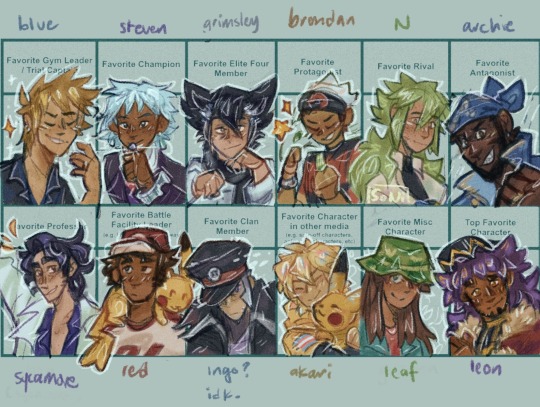
my take on that favorite pokemon characters thing that’s going around!
#this was such a hard choice to make there’s so many other ones i wanted to add#i just haven’t played legends enough to rly have a favorite character… maybe once i get farther in the game ill have a true favorite#no offense to ingo#he’s just familiar from bw:)#really wanted to add raihan and guzma too#my art#Pokemon#pokemon art challenge#pokemon art#steven stone#pokemon blue#pokemon green#pokemon red#reguri#originalshipping#pokemon leon#champion leon#pokemon grimsley#elite four grimsley#professor sycamore#pokemon ingo#pokemon akari#pokespe#pokemon leaf#pokemon brendan#pokemon n#natural gropius harmonia#n harmonia#pokemon archie#aqua leader archie
339 notes
·
View notes
Text


There is so much to love about a Mourn Watch Rook romancing Emmrich. But one area where a non-Mourn Watch romancer has them beat?
The ritual for lichdom. The Lich Lord calls a non-Mourn Watch Rook 'Volkarin's beloved'
Volkarin's beloved
This is before they've officially said 'I love you' for the first time! And I don't know which I prefer. Either A) Emmrich told the Lich Lord that Rook was his beloved during his preparations or B) the Lich Lord knew instinctively that Rook was Emmrich's beloved
I like both options, because at the end of the day, the Lich Lords are simply speaking truth
#hippo's dragon age tag#hippo's veilguard tag#hippo plays veilguard#emmrich volkarin#dragon age spoilers#veilguard spoilers#dav#how many times#can you post in a character tag#in twenty-four hours#asking for a friend
115 notes
·
View notes
Text
Marty McFly truly is THE character of all time.
He's a short king. He's a time traveler. He's an expert skateboarder. He is one of the clumsiest people you've ever met. He's bisexual. He has exactly two friends. He has altered the course of history on more than one occasion. He is traumatized beyond belief. He is genuinely a kind person. He's been shot at by Libyan terrorists. He plays the guitar. His impulse control is nonexistent. He loves his girlfriend more than anyone or anything else in his life. He's a loser. He has so much rizz that it makes any actor who plays him 50% hotter. He's named after himself. His watch is broken. His best friend is a disgraced nuclear physicist who is at least four times his age. He exists in a perpetual state of confusion. He went back in time and fucked around just enough to fix and improve the lives of his entire family. His thoughts run at a mile a minute. He does not have a single thought behind those eyes. He saved himself from being erased from existence by playing the guitar. He accidentally pulled his own mom and dad. He is literally played by Michael J. Fox.
Ngl Robert Zemeckis really cooked with this one.
#happy pride month to HIM#I just like him a lot#sorry the actor one is referring to the musical version cause as someone who has seen four different actors play him on stage YEAH#marty mcfly I love you forever#the character of all time#I just think he's neat#marty mcfly#michael j fox#back to the future#back to the future: the musical#bttf: the musical#bttf#casey likes#ben joyce#elliott evans#olly dobson
339 notes
·
View notes
Note
In your Mithrun analysis, when you say “maybe it's also particularly gentle that, in the end, there was someone who refused to even consider giving up on him.” who is the ‘someone’ in your mind? Milsiril? Kabru and the canaries? I loved your analysis, so I’m curious
OH kabru absolutely
milsiril spared him and, decades later, helped him with his physical rehabilitation, but it seems like she more or less gave up on his personhood. no more desires -> no more mithrun as we knew him -> no more mithrun. she spared him because he wasn’t completely devoid of motivation to live, and she used the single motivator he had left to eventually get him to keep himself alive, and she briefly even seemed to want to try and instill some of his old mask (even with the understanding that that’s what it was) back into him, but that fell through immediately and i think with it went her optimism that mithrun would ever… be a person again. “too late now, i guess.”
then the canaries are on good enough terms with him, but they’re practically instructed to treat him like a weapon or a tool they’re maintaining. i believe it’s cithis that tells kabru to take care of mithrun but clarifies that really what that is is just making sure he eats. ensuring his baseline needs for survival are met. and really, that’s all she was ever tasked with. when it’s all over and mithrun is cataleptic, the canaries stay physically near him, but they seem to have accepted that he’s gone—without the demon to chase, he has nothing to live for. cithis, though, seems to be closer to mithrun than any of the others, and i don’t think it’s a coincidence that she’s the one who calls lycion off and encourages kabru to try engaging with him when she hears the beginning of what he has to say.
this post caught a lot of my opinions regarding mithrun’s relationships (linking to my reblog of it because i dumped some thoughts in the tags) but tldr i do think milsiril and the canaries fall short of thinking of mithrun as a person, and that’s why their relationships with him fail him somewhat. i don’t think that’s their fault, because it seems like they were taught to think of losing your desires as a complete loss of self and humanity, but it does mean they see mithrun as someone who has already been lost. kabru is demonstrably different in that he’s able to help mithrun see a future beyond the demon, and he’s able to do it because he deals with mithrun like he’s human. because he is. and all of that stems from the specific aspect of kabru’s personality that is his obsession with people
#ask#anon#dungeon meshi spoilers#mithrun#love this dynamic because genuinely everything about it that works works because these characters are exactly the ways they are#does that make sense lmfao#like kabru and mithrun’s very specific personality quirks make them each exactly the right person to help the other grow#ALSO HI WAIT THANK YOU i feel like calling that is an analysis is generous but i appreciate it#sometimes you’re just ill about an elf at 2am after playing dnd for four hours#and if you’re me. sometimes is all the time
198 notes
·
View notes
Text

Live Laugh Love Enlighten
#nosramus#fear & hunger#fear and hunger#funger#this thing is over a year old#i only colored it today#for good silly vibes#yeah i'm not overthinking shit#fellowship funger secret good ending#get it? cuz there are only four characters you can play in f&h#nosramus being the fifth member of the fellowship was never gonna lead to a good thing#i wish this alchemist was somewhere in a hidden corner of a library in the second game#just for the good ol' times' sake
84 notes
·
View notes
Text
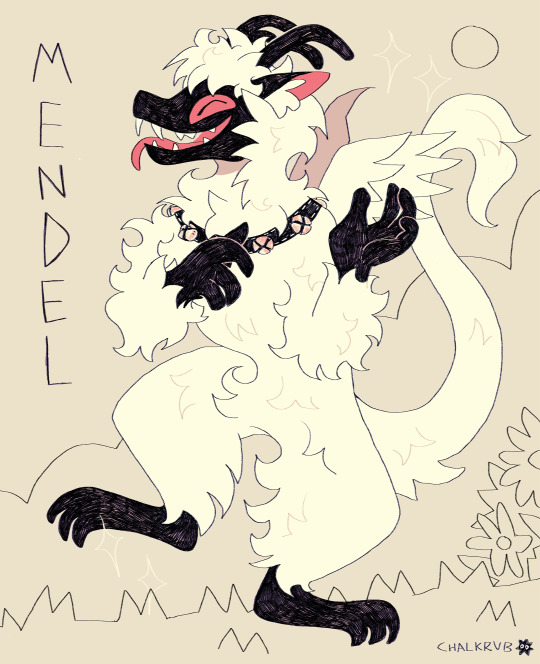
it's mendel!
#my art#oc#mendel#anthro#furry#dragon#bringing back his sleigh bells because they kinda slay (sleigh)#i will revisit this i think. there's more i wanted to do with it but i wanted something to post before I leave for the next week so here...#watched the fnaf movie the other day for friend birthday and it was INCREDIBLY stupid and silly and bad but still a fun time somehow#the tonal whiplash was bizarre and the characters were incomprehensible and the dialogue was ridiculous and unintentionally funny#it's so funny this took 8 years to do what were they DOIN!!!! it cannot have been polishing the script!!!#but the animatronics and set design were incredible. even if they stopped being scary very fast i loved the funny murderous animals#playing elastica connection and iggy pop wild child was a choice that was made#anyway truly wild. i played the first four games and that's it so i can hardly profess to be the target audience#illustration
462 notes
·
View notes
Text
Titch my beloved <3 (ft. Derek)















#shoot from the hip#luke manning#the unrelenting aubergine#pretty man...#watch me make ten bajillion more of these#“[insert character] my beloved <3 ” me to literally every sfth character#anyways I love titch so much#he's so me#(burned out gifted kids where y'all at?)#what a silly stressed farmer#I also find it hilarious how the stoic aubergine farmer is played by the most giggly guy out of the four#I especially loved luke breaks in tua just 'cause it's such a harsh contrast to his character
68 notes
·
View notes
Text

auggie!!
#a while back i thought abt giving her stretch marks since she had vincent and i finally added em ^_^#not much else changed since the last time i drew her ref so im gonna take that as a win since i change my mind so much#the other characters im gonna do next.. lucky herschel mulch and rover.. ill probably change up luckys design again though#i think ill make his fur closer to golden.. maybe thatll go better with the green patch on his hair cuz if i make it too close to orange#it looks more like a carrot than a four leaf clover.. i might also make refs for parhelion and eudora but idk if ill draw them much#aaanndd i still need to revamp serildas design.. i think ill stick with the delinquent vibe. and i wanna revisit analogue's design#presto and shuffles designs are also constantly changing but i think i liked what i did last time so changes will be small.... theyre a#little unique among my characters because i see them as both boys and girls. genderfluid? i dont assign pronouns to my characters#so id like to play around with their outfits and stuff. idk why its like that with them specifically but its fun#my art#myart#my oc#oc#augusta#oc ref sheet#reference sheet#kemonomimi#anthro#humanoid#???#character design
259 notes
·
View notes
Text
my life for a Volstrucker book. we have the Caleb backstory comic but that only gives a very cursory view of the blumentrio only. I wanna see more, more of the training, the work and dynamics of full fledged scourgers. who are these guys when they're not being ~Mysterious or specifically Astrid and Eadwulf in an incredibly specific and narrow scenario that is not at all indicative of the rest of the bunch
#like okay we got like. four glimpses of volstrucker work in the campaign#that one who was Essek's prisoner#Eadwulf and the other one guarding (?) the beacon#Astrid and Eadwulf at the dinner party with the nein#and then. everything from the sanatorium heist to the last fight with Trent#those last two absolutely do NOT tell us about normal volstrucker dynamics. that is like. extenuating circumstances that could ONLY happen#to Astrid and Eadwulf specifically#and then the first two are not enough! too isolated or too background noise!#I think a book about Astrid specifically spanning graduation up to her appearance in campaign two#(but no further)#(let her role in the campaign speak for itself)#one obvious advantage of this would be to give us more volstrucker characters to play with#this has been a post#critical role
48 notes
·
View notes
Text
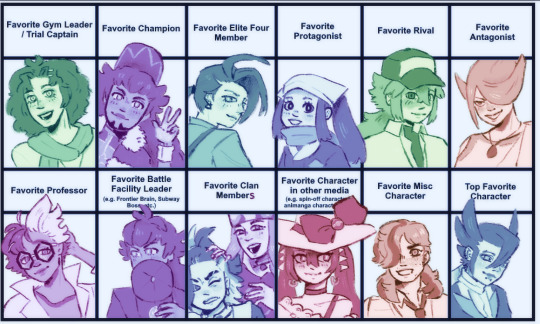
my favorites!!
i really considered making Volo my top favorite...
template source!
#this makes it painfully obvious which games i've played#i tried not to repeat characters (except for leon) which is why rika is in fav e4 even tho grimsley is my top fav#well heres comes one billion tags#burgh#gym leader burgh#champion leon#leon pokemon#rika#elite four rika#rika pokemon#akari#akari pokemon#n harmonia#n pokemon#volo#jacq#jacq pokemon#adaman#clan leader adaman#melli#warden melli#hatsune miku#arven#arven pokemon#grimsley#elite four grimsley#pokemon#sketch#digital art#my art
268 notes
·
View notes
Text

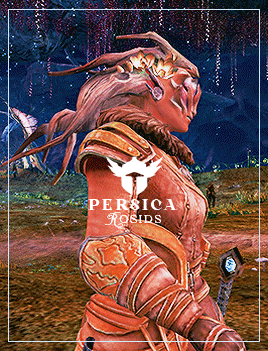
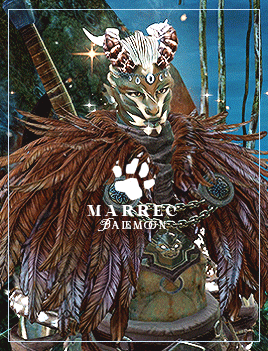
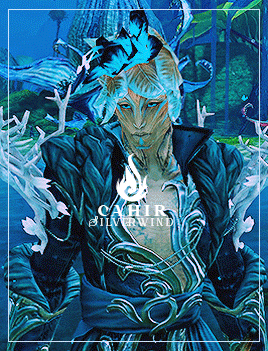
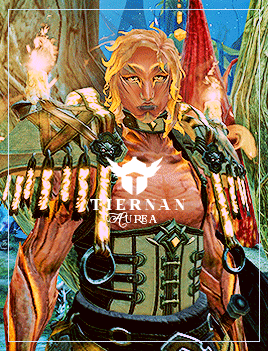
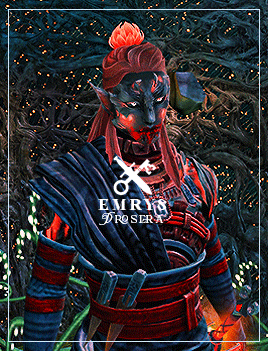
DENRID | PERSICA | MARREC | CAHIR | TIERNAN | EMRYS
↳ Do not fear difficulty. Hard ground makes stronger roots.
#guild wars#gw2#guild wars 2#gw2 commander#sylvari#gw2 oc#mygifs#denrid#persica rosids#marrec balemoon#cahir silverwind#tiernan aurea#emrys drosera#my ocs#i just wanted to make a little set commemorating my salads#theyre my favorites and make me so happy#denrid is my main he's my everything he's my pookie bear#and persica is actually the first gw2 character i ever made back in like 2016/2017 to play with a friend#the other four are very new but i love love love them esp marrec my beautiful angry secondborn moon boy#also denrid is the only one who doesn't have like 'surname'#persica tiernan and emrys's last names are just chunks of scientific names for specific plants#and marrec and cahir have 'title' surnames relating to their classes#but denrid is just denrid but it looked out of place with everyone else so he gets The Title™ heheueeheeeee
156 notes
·
View notes
Text
Aaron’s such an underrated character on Aphblr tbh. He’s become one of my favorite characters in the cast as I rewatch more and more of Mystreet. Aaron will tease you, but he’s also one of the best characters in the cast to go to for emotional support. He’ll tell you as it is, smack you upside the head when you’re being crazy and shake you back to rational normalcy, but then he’ll sigh and tell you you’re gonna be just fine and everything’s gonna be okay. He is the number one (and on occasion only) holder of brain cells in the whole neighborhood. He’s the most sensible, and often the word of wisdom/rationale, much more so than Katelyn or Lucinda or Zane or Laurance are. This can often make him come off as a serious character, but he’s still down to clown! He just does it in a different way!
He’s supposed to contrast Aphmau’s louder, more extroverted, playful, ditzy, eccentric personality, by being quieter, more rational, more responsible, more cautious and careful, more reserved, a word of wisdom to contrast her crazier, chaotic energy and pranking and punning and ponies and general whimsical tomfoolery. But that does not, by any means, mean that he is not participating in the antics. Just because he’s the only one who thought to bring a first aid kit and a safety harness doesn’t mean he’s not jumping off that cliff with everyone else in this crazy cast. You tell him to dig, he’ll bring shovels. He may sigh or say “oh god not again” when shit goes awry or the gang decides they are Dead Set on doing something insane for the 10,000th time, but by god he will commit. Aphmau kidnaps a baby and goes on a mad chase for a comedic bit, and he never complains about how “stupid” and “reckless” and “obnoxious” his girlfriend is, he just says in a completely calm tone, “Now if you’ll excuse me, I need to go save my girlfriend.” And he chases after her immediately lmao.
Aaron enables the antics and participates in them, and if you rile him up or challenge him damn well enough, he will throw himself into the group antics with an unbeatable, fiery fervor. If the boys decide they’re all gonna pretend to be Santa and his elves in order to cause prankster-variety chaos one day, Aaron would join in and go right alongside them. He’s here to make sure it all goes to plan. He’s here to make sure you don’t break any bones when you jump off that roof like a madman. He’s here to help you run away from the cops, help you break into the building. He may chide you for doing it in the first place (“do you even know what you’re doing?!”), and if needed he may drag you back home if you’re barking up the wrong tree and it’s nothing but detrimental to you, but if it’s viable for the bit, he absolutely will show you how to break a window correctly.
And he can be a little shit if he wants to, too!! He can snicker at you and tease you and make quips, and I bet if Aaron himself dedicated his energy to it, he would make the best of pranks. He’s not an asshole that’s full of himself and too serious and stoic and cool for being silly, he’s not a whiny bitch, he’s actually very incredibly supportive. At times, much more so than Garroth, Laurance, Zane, Katelyn, etc. He’s reliable, he trusts Aphmau a lot, he knows how shittily Aphmau cooks and still does his damndest to support her, and he will force himself to eat her biohazardous cooking just to make her happy. He is the chef of the household. He’s good with animals, animals love him. He’s a kind guy!!! He’s just got his own unique energy and vibe to him, that no one else in the cast really has, and I really appreciate that core trait of him. He’s a grounding character. He’s probably got his own ways that he’s weird and eccentric that are a lot more hidden than Aphmau’s. If we didn’t have Aaron, the entire neighborhood would have burned down ages ago, ten times over.
I genuinely do believe he’d make a fantastic dad, being a combination of a soft and gentle and tenderly loving man, and responsible enough to always bring safety helmets and bandaids and snacks, very supportive of his kids development, emotionally available as a great source of genuine advice and wisdom while still getting plenty of encouragement. He would probably want to make an effort to be a very different parent than his father was, and since he was emotionally neglected as a child, he would refuse to do anything similar to his own kids. He’d be a good influence (and Aphmau would be the bad influence LOL)
He’s kind of a teddy bear of a man <3 If he weren’t so heavily wolf-themed, I’d say a bear would be the best animal that’d fit his personality and energy. He’d protect you like a bear, he can be really fucking terrifying if he wants to, but he’d only use that power to make sure Aphmau gets what she wants and needs to make her happy. He’d never use that terrifying intimidation factor of his on his friends and loved ones, never as anything more than a single look that has a derailing Garroth/Laurance/Travis/Dante/Gene/etc. get right the fuck back on track and start backpedaling, like if they started saying or doing something careless or stupid that made Aphmau feel worse. He’s quiet and reserved with that tired, grounded, solid energy of a bear. He’s a big guy. But he can also be really soft and supportive and sweet. He takes more time to come out of his shell and let down his walls, but when he does, he really dedicates his life to the few people he manages to trust. And it’s that thick outer shell that makes Aphmau a good match for him, because she’s kinda the only character in the cast who’s able to bring him out of his shell so easily.
She’s kind and extremely friendly, unstoppably and unendingly so. She’s sweet and naive and selfless in the way that proves to Aaron that she’s not trying to get anything out of him, she’s not lying to him, and she would never neglect him or just…abandon him like a discarded toy once she’s through with him. She’s not scared of him. She sees the best in everybody, and sees that there’s something more underneath that scary, prickly outer shell of defenses that’s managed to push everyone else away and keep the likes of Laurance and Garroth and Katelyn on their toes. She sees what no one else does, she sees the true beauty and the kind heart he has underneath. Even in MCD, when he’s literally held a sword to her throat and threatened her life multiple times, she can still sense that he’s full of shit and there’s a kind heart underneath, and if she does a little cultivating, extends a hand of gentle kindness and genuine affection, a kind of love and affection he’s never really seen before and been starved of all his life… it works wonders, and he steps out to meet her. He changes, drastically, because she sees the best in him, and that makes him want to become the best version of himself that he can be, for her. Where he might hate himself and grapple with feeling unloveable, Aphmau is there to remind him none of its true. And so he tries to keep her nightmares away in return, sticking by her side, taking care of her, cooking for her, encouraging her to keep doing everything she does best, defends her against the bullies that make her feel like she’s not good enough, and takes her by the shoulders to remind her that she is good enough, and all the voices out there and in her head that tell her she’s not are full of shit. Because he knows first-hand, better than most, the good things she brings to those around her and the wonderful presence she is in others lives, and how wonderful she is as a person. He trusts her. He’s here to guide her along in her path to becoming her fullest self, to give her that last big nudge to boost her along the way. Likely on a cosmic level, mainly, with her becoming Irene.
He’s very sweet, he’s sweet to Aphmau, Aphmau’s even sweeter to him, and genuinely I’ve learned to love the big, fluffy guy and I really appreciate him and his impact on the other characters the more and more I see of him. I don’t really know how I would enjoy Mystreet or MCD or the Aphverse without him. If he were real, I would love to give him one big hug, I bet his hugs would be amazing (topped only by Garroth’s rib-crushing bear hugs)
#aphmau#aphblr#mystreet#aphverse#aaron lycan#aphmau aaron#mystreet aaron#aarons a wonderful character and a great guy#dude id trust him with anything. mans fuckin reliable#my dog. my stuff. my life#…my wife#lmao#and also honestly like. as someone whose so proudly against cringe culture and tries their best to encourage others to embrace their weird#and the fun parts of life and creativity#no matter how silly or stupid or weird it is#I really have ZERO place criticizing aaron or Aphmau for being self-insert characters#ohh wow yea look he’s a self insert of the directors husband. wow look she put her husband in her story#yea every time i come across a new show or comic or book that I like the nm 1 first thing I do is make sonas for me and my partner#in those shows and their worldbuilding.#‘he’s a self insert’ as if you didn’t make five of those when you were younger. and are still doing it now to this day#I have like four or more self insert ocs. cringe culture is bullshit and we uphold cringe culture mean careless bullshit way too much on#aphblr. free the Mary sues and the self inserts. be cringe be free be weird. write that werewolf omegaverse twilight fanfiction#never grow out of your werewolf x vampire phase#and play some motherfucking minecraft#embrace the Aphmau. live that good life. I’m happy and I’m cringe and I am free#and I’m giving aaron a little kiss on his head#and pats and scritches#give scritches to your local bear today#rambling
50 notes
·
View notes